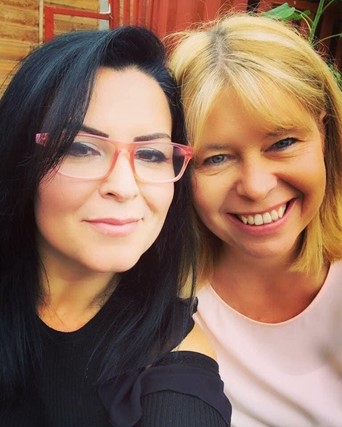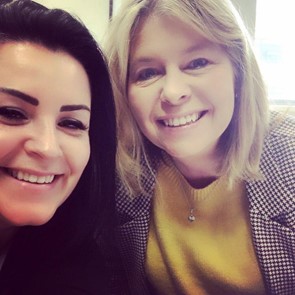Advanced Nurse Practitioner – The Journey!
20 Dec 2021 | Anne Marie Fogarty
| Share with

Introduction
The nursing profession is evolving and rightly so. Years of experience, decision-making capabilities, clinical knowledge, and communication skills are being merged into advanced levels of nursing practice in the form of the Advanced Nurse Practitioners (ANP) Masters.
We recently had the pleasure of speaking with two ANPs based in Essex – Amelita Biba and Sally Holland. Between their combined years of experience and passion for the role, it is easy to see why they have chosen to advance their nursing practice with the ANP course.
A little background…
Advanced practice is a level of practice rather than a type of practice. ANPs are educated to Masters level and have been assessed as competent in practice using their expert clinical knowledge and skills. They have the freedom and authority to act, making autonomous decisions in assessing, diagnosing, and treating patients as a medical colleague would.1
To apply for the ANP training, you will need to be a senior nurse usually band 6, with two years of experience in a senior position. Registered nurses working at this advanced level must meet the following standards.
They must:
- have an active registration with the Nursing and Midwifery Council (NMC)
- practice within the four pillars – clinical practice, leadership and management, education and research.
- have a job plan that demonstrates advanced nursing practice and has equity with peers working at this level
- be educated to Masters level
- be an independent prescriber
- meet NMC revalidation requirements
- demonstrate autonomous evidence 2
What does the ANP course offer to both the nurse and the healthcare system in general?
The ANP course or level of study means that the nurse can work within the nursing and medical teams -merging both into almost one care team with best practice, advanced knowledge, and patient care at its core.
One of the many benefits of advanced practice means the nurturing and advocacy skills that nursing brings are utilised along with the capability to practice at a higher level with a good medical understanding also.
Amelita, who qualified in 2012 as a Paediatric Nurse, went on to Clinical Nurse Management as a Band 6 and after many CPD achievements, she wondered what else was out there for her. Loving a challenge, Amelita decided to do the ANP course at London South Bank University, with her colleague and friend Sally. Sally had a vast array of nursing experience and CPD under her belt entering the ANP course.
Amelita tells us that as paediatric ANPs, they get to care for young patients holistically and throughout the entire illness trajectory, from presentation at the A&E right up to discharge. As nurses, they still follow the Code of Conduct and have NMC PINs which both are very proud to hold. But having the ANP means they can practice alongside the medical and nursing teams in an advanced way. In fact, often covering registrars shifts and more medical dominated roles, but proudly claim, “we will always be nurses.”
What are the benefits of doing the ANP course for the relevant trust?
At Basildon Hospital, on completion of their ANP course, Amelita and Sally ran (supported by the Clinical Director) a new Rapid Access Clinic for babies under 10 days old – they would be assessed and cared for in this clinic separate from older babies which protected them as they were too young to have sufficient immunity. As a direct result of the ANP training, Amelita and Sally were in a position to run this clinic and make critical care decisions from a medical and nursing perspective. Sadly, it has closed but plans to reopen again.
Amelita and Sally are good friends who supported each other through the journey of becoming ANPs. There were many challenges along the way but having a like-minded peer and friend to lean on was critical.
Amelita Biba and Sally Holland, ANP at Basildon Hospital.
What were the challenges you faced doing the course?
For Amelita, the biggest challenges were logistics, being away from her young family, taking on many roles and academically, the non-medical prescribing module proved difficult.
Sally also discovered the challenge of getting to the university, juggling work-life balance and an already busy nursing career at the Basildon Hospital in the Paediatric Assessment Emergency Clinic.
Both agreed it wasn’t an easy two years but well worth the sacrifice. “The course was very well run and taught us everything we needed to know to become advanced practitioners,” says Sally.
What does the ANP add to the nursing role?
ANPs can assess, plan care, treat, prescribe, make treatment decisions, and discharge patients, at an advanced level of nursing care.
Because their trust didn’t previously have ANPs, they were new and breaking ground. Following the medical rota at first—the Paediatric Consultant rota actually, which wasn’t an easy task. “We were, initially, a little unsure of the role and where it fits into practice.” “However, with the trust and our families support behind us, we flourished in our new roles at Basildon Hospital,” Amelita and Sally both agreed.
Are there more opportunities for flexible working and a better work-life balance with advanced qualifications such as the ANP?
ANP can fill the gap where medical or nursing staff are required. Also, ANP can work in many nursing and even medical roles, where it may be difficult to staff. Flexible working is an option for the ANP, as they can choose many different areas to practice confidently in.
Advanced level practice isn’t a specific role; it includes all practitioners who have progressed to an advanced level through further education and training. Advanced practitioners can be found across a range of professions and sectors.3
The ANP role
The role has developed partly to address demand and workforce issues.
As ANPs we can:
- prescribe any medicine for any condition within their competence (including some controlled medicines) provided they have completed an Independent Prescribing qualification
- see patients with undiagnosed, undifferentiated medical conditions and make treatment decisions, including ordering necessary investigations
- refer patients to secondary care, although this can vary depending on local arrangements and protocols
Given the opportunity to go back in time – what would you do differently?
Both Sally and Amelita love nursing. The Masters level of education is very hard, but it opens up many opportunities in flexible workforce solutions or full-time careers. It can also bridge the nursing and medical gap. ANPs understand the nursing element of care and the medical element also. As an ANP, Sally suggests that having the course behind her helps unite the nursing and medical teams, which is a novel concept.
ANP Role and the future
Both Amelita and Sally say the ANP role has evolved, being one of the first Paediatric Nurses from their trust to be funded for the course was both a privilege and a challenge.
Conclusion
Nursing is undoubtedly changing and advancing throughout the UK, becoming a unique profession, growing clinically and academically, and rewarding despite the many challenges.
As Amelita and Sally so aptly conclude, “Nursing is a career we both love and wouldn’t change for the world!”
References
- Welcome – Advanced Practice. https://advanced-practice.hee.nhs.uk/
- The forward vision of advanced practice. https://www.slideshare.net/KatieRCN/the-forward-vision-of-advanced-practice
- RCN Credentialing for Advanced Level Nursing Practice. https://www.rcn.org.uk/-/media/royal-college-of-nursing/documents/professional-development/credentialing/credentialing-handbook.pdf?la=en&hash=5DCC2513C9A347F3AB044DCCE0BC27D6
Leave a Comment
You must be logged in to post a comment.


20 Dec 2021 | Leave a comment
Share with socials